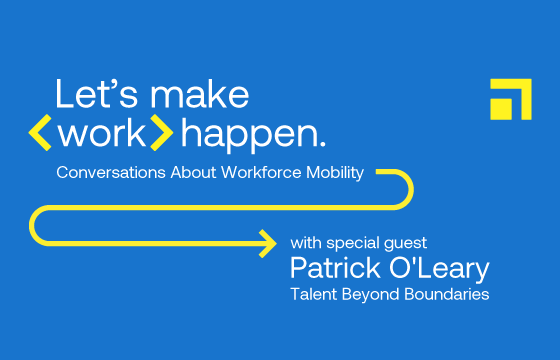
Let’s Make Work Happen: Solving the Talent Shortage
Patrick O'Leary from Talent Beyond Boundaries joins Jen for Episode 7 of our hit web series, where he shares how TBB delivers a meaningful solution to the global talent shortage.

Patrick O'Leary from Talent Beyond Boundaries joins Jen for Episode 7 of our hit web series, where he shares how TBB delivers a meaningful solution to the global talent shortage.

Across North America, truck drivers are in short supply. So some employers are getting (very) creative when it comes to finding and training a new generation of young talent.

After working outside the office during the pandemic, employees are convinced they can work from anywhere. But is this truly feasible? And what are the risks?

Live and in-person internships are back! But does your company offer the mobility benefits and program structure to attract the young talent you need?

Post-pandemic workforce mobility may look different, but an answer to that age-old question of how to accurately measure mobility's return on investment (ROI) — and report it senior leadership — remains as elusive as ever.

Generation Z will make up over a quarter of the workforce in just four years. Is your company's relocation program built to attract and engage them?

Proud to be a part of an initiative designed to spark interest in workforce mobility and fuel our industry with new talent for years to come. Quite frankly, it's an effort that's long overdue.

The greatest challenge companies face in these times is sustaining their culture across a remote workforce connecting virtually.

Companies that don't include the mobility function in candidate selection do so at their own risk, and most hiring managers still need to be educated and made aware of the power of diverse and inclusive teams.

A flawless relocation program that supports your company’s talent acquisition, development and retention efforts. Does it sound a little too good to be true?

Are you new to the mobility industry? Don’t worry, we know how overwhelming it can be! In an industry as complex as ours, it’s not unusual to feel like you don’t have a great understanding of mobility.

As more organizations realize the value of interns in growing their workforce and expanding their talent pool, relocation benefits for interns becomes a hot topic.

Lump sums are low-cost, low-maintenance options for relocating talent. But without proper planing or guidance, they can prove to be more curse than blessing.

Now more than ever India is among the world’s emerging markets, poised to become one of the leading sources and recipients of skilled talent to meet the demand of global business growth.

The classic film about a small-town man with big-city dreams offers a blueprint for building a better mobility culture.

You don’t know what you have until it's gone. However, if you're one of the lucky few, or should I say, the perceptive few, you'll realize the value of the talent that keeps your company rolling.

Today, as companies struggle to fuel their talent pipelines with specialized skills and millennials, rotational assignments are much more widespread. And serve a wide range of purposes.

Amidst tougher competition for the best and brightest employees, 60 percent of companies say that relocation policy benefits are critical to recruiting talent.

Q: Our company moves a lot of new hire grads who receive a lump sum. Is there a best practice for whether or not this lump sum should be grossed-up?